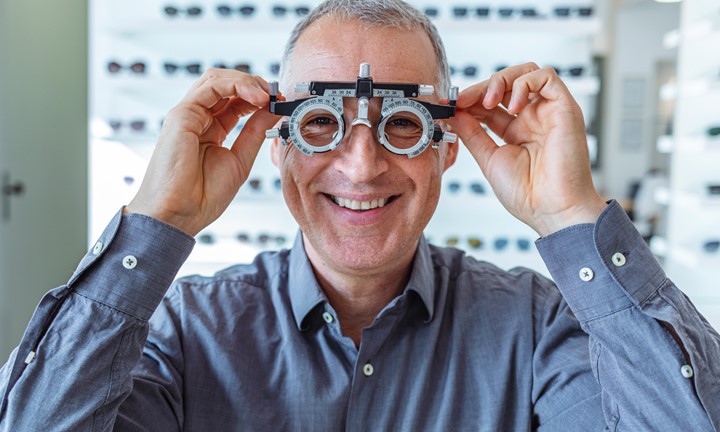If you have ever searched for a new eye doctor, you’ve probably noticed there are different kinds to choose from. Two of the most common types of eye doctors are optometrists and ophthalmologists. What is the difference between an optometrist and ophthalmologist, and how can you determine the right eye doctor for your vision and eye needs?
The difference comes down to the services they provide. The two names sound similar, which frequently causes confusion for those searching for the right eye doctor.
Let’s look at these two types of eye doctors in more detail. We’ll explore their qualifications, education, training, and specialties as we examine what makes optometrists and ophthalmologists unique.
What is an optometrist?
Optometrists make up the majority of the VSP® network and can be identified by the letters “O.D.” behind their name, which stands for Doctor of Optometry. After receiving a four-year college degree, optometrists attend optometry school for four years (that’s eight years of education!) and often do an extra year of residency in specialized fields of eye care such as eye disease, vision therapy, and contact lenses.
Your optometrist is an essential health care provider who can examine, diagnose, treat, and manage diseases and disorders of the eye. Essentially, optometrists provide for nearly all medical aspects of your eye care. Think of them as the “general practitioner” for all things related to your eyes. Does VSP cover optometrist visits? Learn more about what our VSP Individual Vision Plans cover.
What kind of training and education do optometrists need to have?
Optometry school is four years of additional education after finishing a bachelor’s degree. Upon completion, optometrists earn a doctorate degree, and some go on to complete residencies or pursue additional specializations, such as pediatric care optometry, vision therapy optometry, myopia control, and ocular aesthetics, to name a few.
What eye conditions do optometrists treat?
Optometrists conduct eye exams and vision tests, and provide diagnoses and treatment of eye conditions like glaucoma, pink eye (conjunctivitis), and macular degeneration, and consult on pre- and post-surgical eye care.
Optometrists are frequently the first to observe signs of many serious health conditions like hypertension, blocked arteries, diabetes, and even arthritis. Should a systemic health condition be present, they will partner with your overall healthcare team to ensure appropriate follow-up care.
But their work doesn’t stop there. Optometrists also help with diagnosing eye-related medical conditions, such as:
- Chalazion — a bump on the edge of the eye
- Dry eye disease — inflammation of the cornea (protective outer eye layer) or conjunctiva (tissue lining)
- Strabismus — misalignment of the eyes
- Glaucoma — a group of eye conditions that damage the optic nerve caused by high pressure in your eye
- Allergies — itching, tearing, blurred vision, or burning in the eye or on the eyelid
Additionally, optometrists offer a wide variety of services beyond an annual eye exam. They can prescribe corrective lenses and other ocular medications, perform laser eye procedures, administer preoperative and postoperative care to patients undergoing eye surgery, and remove foreign bodies from your eyes.
What are some reasons to see an optometrist?
There are many reasons why you should see an optometrist. The most common reason for seeing an optometrist is for maintaining overall eye health and maintaining any corrective vision needs during your yearly eye exam. But you may have eye-related concerns, such as dry eyes or eye strain from working with computers, that they can help diagnose and treat.
Another reason to visit an optometrist is if you have a medical concern that could immediately or eventually impact your vision. Diabetes can lead to glaucoma and even blindness if left untreated. Your eye doctor can determine if diabetes is impacting your vision and help you address potential risk factors. Keeping tabs on your eye health can do more than just save your vision; it can give you a closer look at your overall health.
What to expect when you see an optometrist?
Do you have an upcoming visit with your optometrist? Start preparing by making a list of any concerns you have before arriving at your appointment. We have all left an appointment and immediately remembered a question we had wanted to ask, so having a list prepared can help you keep track of everything. If you have any questions about insurance coverage for any eye health, be sure to review VSP Individual Vision Plans’ benefits and savings information.
When you arrive at your eye appointment, you may be asked about your personal medical history and any vision issues in your family to help your optometrist spot any potential warning signs. After that, they will begin your exam. They’ll perform a list of tests to examine eye alignment, reactions, vision, and more. Here are some of the common diagnostic tests your optometrist might perform at your next visit:
- Eye muscle movement test: This test checks the alignment of your eyes. The optometrist will determine the mobility of your eyes by watching how efficiently your eyes follow a target, such as a pen or their finger, as it moves in different directions.
- Cover test: To test how well your eyes work together, you’ll be asked to stare at a target while your optometrist takes turns covering your eyes and observing the movement of each eye. Your eye doctor will also be watching for any turning from the target, which is a key characteristic of a condition called strabismus.
- External exam and pupil reactions: In this test, your eye doctor watches how your pupils adjust to light and objects close to you. At the same time, the whites of your eyes and the position of your eyelids will also be examined for potential strabismus.
- Visual acuity test: This is the classic alphabet test everyone thinks of when they imagine going to the eye doctor. To complete this test, you’ll look at a poster across an exam room and read appropriate letters to determine how sharp your vision is from a distance.
- Refraction testing: For this eye test, your doctor will fine-tune to the right prescription by flipping back and forth between lenses and asking you which performs better.
- Slit lamp (biomicroscope): This device magnifies and lights up the front of your eye to check your cornea, iris, lens, and the back of your eye, looking for signs of certain eye conditions such as cataracts or glaucoma.
- Retinal examination (ophthalmoscopy): Your eye doctor may choose to dilate your pupils and use a tool called an ophthalmoscope to create a better view of your retina, retinal blood vessels, and the head of your optic nerve. This can also be used to look for fluid buildup.
Make sure to discuss with your optometrist what tests they’re performing and what is best for you at your visit.
How to find an optometrist?
There are lots of ways to find great optometrists, including through word of mouth. However, one of the easiest ways to find a VSP network eye doctor is on the VSP website. Find an optometrist in your area now.
What is an ophthalmologist?
An ophthalmologist is a physician who specializes in diseases, surgery of the eye, and adjacent structures, and can prescribe glasses and fit contact lenses. An ophthalmologist has completed 8 to 10 years of specialized training following college. This includes four years of medical school, a year of an internship in a hospital, three years of ophthalmology training (residency), and often a year or two of fellowship training in a sub-specialty area within ophthalmology. Ophthalmologists are licensed by a state medical board. Look for the letters “M.D.” or “D.O.” behind their name.
As your primary eye care provider, your optometrist will manage most of your eye care needs and refer you to an ophthalmologist when specialty or surgical eye care is needed.
What conditions do ophthalmologists treat?
Most ophthalmologists split their work between vision clinics and the operating room. When working at a clinic, an ophthalmologist works with patients to diagnose and treat eye health concerns such as eye cancers, glaucoma, cornea problems, macular degeneration, and cataracts. They treat acute eye conditions and injuries that need immediate medical attention.
When in the operating room, ophthalmologists perform several important procedures such as:
- Corneal transplants
- Glaucoma surgery
- LASIK and other laser vision surgeries
- Cataract surgery
- Correct tear duct issues
- Repair damaged or detached retinas
When should I see an ophthalmologist?
You will likely know when to see an ophthalmologist because your optometrist will refer you if necessary. If you have eye health concerns that go beyond routine issues, or if you’re considering corrective vision surgery, seeing an ophthalmologist is a viable next step.
Ophthalmologist vs Optometrist: What's the Difference?
The core difference between ophthalmologists and optometrists is similar to the difference between specialized care and your primary care physician. Your optometrist oversees the general health of your eyes and takes care of the day-to-day vision and eye concerns that you may face. Ophthalmologists come in when there is a specific issue that requires specialty care. While both can perform eye exams, optometrists typically treat general eye health concerns, and ophthalmologists take care of specialized eye health needs. Each type of eye doctor offers important services, but it is important to remember they have different specialties.
What is an optician?
You may have heard of opticians and wondered how they relate to optometrists and ophthalmologists. An optician is a technician skilled in fitting eyeglasses and lenses as prescribed by your optometrist. Opticians don’t conduct exams or visual tests, which is why they are not listed separately in our directory.
Which type of eye care professional should I see?
This depends on your specific need, but generally speaking, here are the guidelines on which type of eye doctor you should see:
- An optometrist provides eye care, such as a yearly comprehensive eye exam or refilling an eyeglass, contact lens, or eye medication prescription. They also can take care of other eye-health related needs between yearly exams and provide early detection of many systemic health conditions.
- An ophthalmologist provides medical and surgical treatment of eye conditions.
- An optician works at your local optometrist’s office or vision care center and can help if you need an eyeglass or contacts prescription filled or adjusted.
Both optometrists and ophthalmologists are always looking out for your total, not just visual, health and are a key part of your overall healthcare team. Whatever your need may be — an O.D., D.O., or M.D. — you can find them within the VSP network of highly knowledgeable doctors.
If you're looking for an eye doctor, VSP offers flexible coverage to help you find the eye care you need, when you need it. With VSP, you’ll have access to the largest independent network of eye doctors in the country. One in four Americans choose VSP. Learn more about VSP Individual Vision Plans and find the right eye doctor for you.
Disclaimer: Information received through VSP Individual Vision Plans’ social media channels is for informational purposes only and does not constitute medical advice, medical recommendations, diagnosis, or treatment. Always seek the advice of your physician or other qualified health provider with any questions you may have regarding a medical condition.
Your vision. Your way.
Not covered for vision? Get an individual plan, customized for you – including where you want to use it: at the doctor, in a retail location, or even online.

The Top 5 Reasons People Delay Eye Exams
Your vision and eye health matter. Regular eye exams are one of the best ways to keep your eyes and vision as healthy as possible. While you might h...

VSP Vision Insurance Questions and Answers: Part 2
Understanding your vision insurance can help you maximize your benefits and make informed choices about your eye care. This article answers common q...

These 7 Questions Help You Choose Great Vision Insurance
You’ve decided that having a vision insurance plan is a smart move for your eye health. Congratulations! Now, time to pick your vision plan. ...

